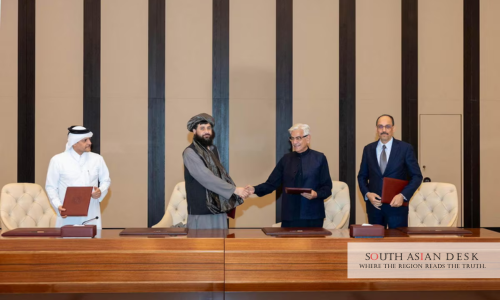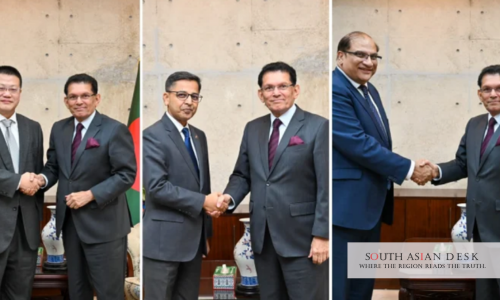ISTANBUL – The Pakistan-Afghanistan peace talks in Istanbul entered their third day on Monday, with no breakthrough, as delegations grappled with accusations of stalled cooperation on cross-border security.
The discussions, hosted by Turkey, build on the fragile ceasefire along the Pak-Afghan border, agreed in Doha on 19 October 2025. They address escalating tensions that have killed at least 30 people in recent clashes along the 2,600km frontier. Pakistan’s Defence Minister Khawaja Muhammad Asif and Afghanistan’s Mullah Mohammad Yaqoob Mujahid lead their teams, focusing on long-term truce terms amid mutual distrust.
These talks matter for South Asia because instability along the Durand Line fuels militancy, displaces communities, and hampers trade worth billions of dollars. A lasting deal could unlock economic corridors and reduce refugee flows, but failure risks broader conflict drawing in regional powers.
Trump Pakistan Afghanistan Help Offer Revived
US President Donald Trump reiterated his willingness to mediate during a summit in Kuala Lumpur on Sunday. “I’ll get that solved very quickly. I know them both,” Trump stated, adding, “I have no doubt we are going to get that done quickly.”
His comments came hours after weekend skirmishes near the border claimed five Pakistani soldiers and 25 militants. Trump, who has positioned himself as a deal-maker on South Asian issues, first floated the idea of assistance last week as clashes intensified. Pakistani officials have not commented on the proposal, but it echoes past US involvement in Afghan affairs.
The offer underscores America’s enduring presence in the region, despite the troop withdrawal in 2021. Analysts note Trump’s approach could pressure the Taliban, whom Pakistan accuses of sheltering Tehrik-i-Taliban Pakistan (TTP) fighters. Kabul rejects these claims, insisting on sovereignty.
In Islamabad, sources close to the delegation described Trump’s intervention as “potentially useful” but secondary to bilateral efforts. The US maintains diplomatic channels with both sides, though sanctions on the Taliban persist.
Taliban TTP Talks Deadlock Dominates Agenda
A key sticking point emerged in the deadlock of the Taliban-TTP talks. Pakistan demands verifiable action against TTP bases in Afghanistan, which Islamabad links to 500 attacks this year alone. Two security sources alleged the Afghan side showed little cooperation.
A Taliban delegate countered these assertions as “false,” emphasising productive exchanges in a “friendly environment.” Spokesperson Zabihullah Mujahid reinforced this, stating, “The Islamic Emirate of Afghanistan supports dialogue and believes that problems and issues can be resolved through dialogue.”
The TTP, distinct from Afghanistan’s rulers despite shared ideology, has intensified operations since the Taliban’s 2021 takeover. Pakistan blames Afghan soil for enabling strikes, including one that killed 12 troops last month. Data from Islamabad’s interior ministry records 1,200 TTP-linked deaths since then.
Mujahid’s remarks align with official Taliban policy, but Pakistan views them as evasive. Asif, speaking before the Istanbul round, warned of an “open war” if it were not met. This rhetoric underscores the high stakes, with both militaries on alert.
Pak-Afghan Border Ceasefire 2025 Holds Precariously
The Pak-Afghan border ceasefire 2025, inked in Doha, paused hostilities after Pakistan’s airstrike on a TTP leader in Kabul sparked retaliatory fire. That 19 October pact, facilitated by Qatar, averted escalation but excluded enforcement mechanisms.
Clashes resumed briefly over the weekend, with artillery exchanges near Torkham port. Pakistan’s military reported neutralising 25 militants, while Afghan forces claimed defensive actions. No civilian casualties were confirmed; however, approximately 5,000 families were displaced.
The ceasefire’s fragility is directly tied to the Pakistan-Afghanistan peace talks in Istanbul. Delegations reviewed compliance reports, revealing gaps in intelligence sharing. Turkey’s mediation, leveraging its ties with both, aims to extend the truce through joint patrols.
The economic fallout from disruptions includes a loss of PKR 2 billion in exports. Traders along the border urge a swift resolution to resume normalcy.
Background: Roots of the Border Tensions
Tensions stem from the porous Durand Line, which has been disputed since 1893. Post-2021, TTP relocated fighters to Afghanistan, exploiting Taliban hospitality. Pakistan’s fencing efforts, which are 90% complete, have reduced incursions by 40%, according to defence data.
The latest flare-up followed Islamabad’s 13 October strike, killing TTP commander Mufti Mazahim. Taliban vowed revenge, shelling posts and downing a drone. This marked the worst violence since 2021, eclipsing 2019 exchanges.
Regional dynamics complicate matters. China, via CPEC, presses for stability, while India watches warily. The UN has called for de-escalation, citing humanitarian risks.
Pakistan’s sacrifices against terrorism total over 90,000 lives lost and PKR 500 billion in damages over decades, as noted in official tallies. Hosting 4.5 million Afghan refugees strains resources further.
What’s Next for Pakistan-Afghanistan Peace Talks in Istanbul
Delegations plan to reconvene on Tuesday, potentially inviting Turkish observers for verification. Success hinges on TTP relocation timelines and border monitoring pacts.
Speaker of Pakistan’s National Assembly Sardar Ayaz Sadiq welcomed the Doha ceasefire as a “significant step” and the Istanbul phase as a “path to peace” in a statement issued on 19 October. He urged eradicating terrorism hubs for mutual prosperity.
If deadlock persists, Asif’s war threat could materialise, though military restraint prevails. Trump’s help for Pakistan and Afghanistan might catalyze progress, but locals doubt quick fixes.
The Pakistan-Afghanistan peace talks in Istanbul represent a narrow window for de-escalation. Failure would deepen divides; success could redefine South Asian security.
Published in SouthAsianDesk, October 27th, 2025
Follow SouthAsianDesk on X, Instagram, and Facebook for insights on business and current affairs from across South Asia.






